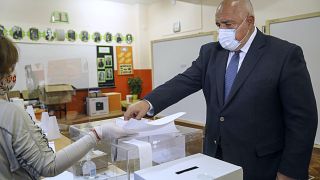
Bulgarian Prime Minister Boyko Borissov casts his ballot during parliamentary elections in the town of Bankya
SOFIA, April 5 (NNN-AGENCIES) — Bulgarian Prime Minister Boyko Borissov’s right-wing GERB party was leading exit polls on Sunday evening with an estimated 25% of the vote, compared to 33.5% at the 2017 election.
The three-time premier lost ground to protest parties amid accusations of endemic corruption.
Bulgarians voted Sunday in a parliamentary election widely seen as a referendum on Borissov after months of anti-government protests and amid a surge in coronavirus infections.
A new populist party led by TV personality Slavi Trifonov appeared neck and neck with the Socialist Party, at around 15% to 17%.
Parties that took to the streets last summer also did well, with Democratic Bulgaria (centre-right) projected to win 9% and “Stand up! Mafia out” (left) expected to enter parliament for the first time with 5% of the vote.
Exit polls suggested that Borissov would face complex coalition talks to secure his fourth term — and possibly even another election in the fall in case of prolonged political deadlock.
While many feared a very low turnout due to coronavirus anxiety and the absence of postal or proxy voting, participation was higher than expected.
Turnout was nearly 40% at 5:00 pm local time (2:00 pm GMT), compared to 42% at the same time in 2017, according to the electoral commission.
“The vote was marked by a mobilisation of urban voters and young people,” said Boriana Dimitrova, director of the Alpha Research Institute on Bulgarian television.
Polling stations had also been set up in hospitals and mobile ballot boxes were made available to families in quarantine.
Borissov has led the populist GERB party since its founding in 2006 and has ruled Bulgaria with an iron grip for most of the last 11 years.
Support for Borrissov has eroded since thousands took to the streets and accused the government of being influenced by oligarchs, failing to eliminate graft and poverty and failing to overhaul the judicial system.
President Rumen Radev, a vocal critic of Borissov, urged Bulgarians to turn Sunday’s election into the first step toward a return to laws and rules.
“I voted against the collapse of statehood, lawlessness and corruption and for a free, just and prosperous Bulgaria,” he said Sunday after voting.
Some 6.7 million eligible voters were electing 240 lawmakers.
Bulgaria, which joined NATO in 2004 and the European Union in 2007, has been repeatedly criticised for corruption and deficiencies in the rule of law and media freedom.
But Borissov on Sunday trumpeted the country’s ties with the West.
“The immense support we received from our counterparts in Europe shows the importance of a stable European government in Bulgaria,” he said.
The latest election polls suggested that while the vote may produce a fragmented parliament that will struggle to elect a new government, Borissov’s GERB will end up with the most seats.
The polls showed the party 5-10 percentage points ahead of its main challenger, the Bulgarian Socialist Party, but far from gaining the absolute majority needed to govern alone.
The leader of the Socialists, Kornelia Ninova, said she voted for “reforms and stability,” and for “a social Bulgaria which won’t leave anyone alone in the crisis.”
Several smaller groups are expected to ride the anti-government sentiment to secure the 4% threshold required to enter parliament for the first time. — NNN-AGENCIES






